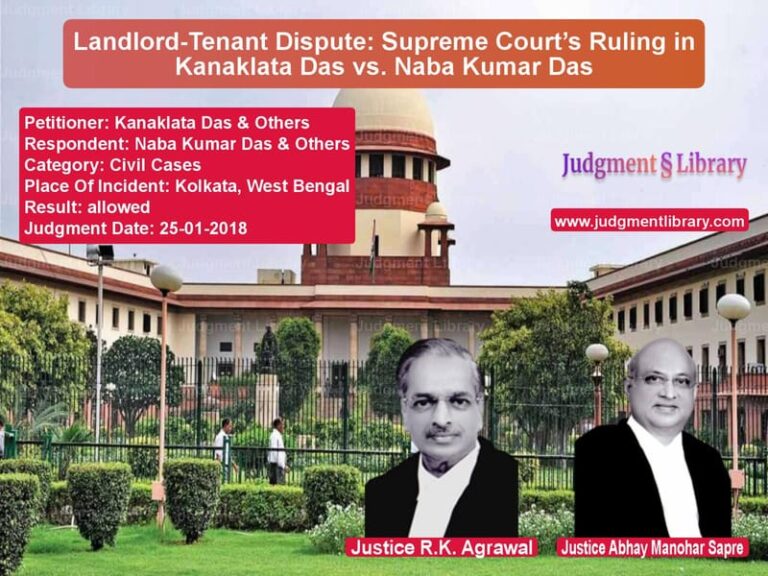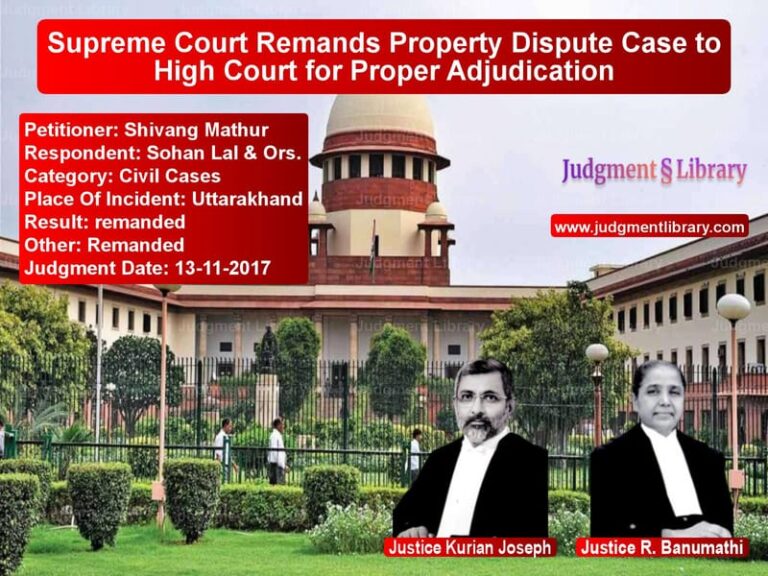Election Dispute Over Councillor Disqualification: Supreme Court Ruling on Byelections
The Supreme Court of India recently ruled in the case of Nitin Bandopant Salagre vs. The State Election Commission & Anr., addressing a dispute related to the disqualification of a municipal councillor and the subsequent byelections. The case involved multiple appellants who contested elections in different wards of the Bombay Municipal Corporation and sought to be declared elected following the disqualification of the original winners due to invalid caste certificates.
Background of the Case
In February 2017, general elections for municipal councillors were held in Mumbai. Mrs. Kesharben Murji Patel was declared elected from Ward No. 76, which was reserved for candidates from the backward class category. However, her caste certificate was later invalidated, leading to her disqualification on April 5, 2019. Similar situations arose in other wards, leading to multiple petitions.
The appellants, who had secured the second-highest number of votes in their respective wards, argued that under Section 33 of the Mumbai Municipal Corporation Act, 1888, they should be declared elected instead of holding a byelection. The State Election Commission, however, issued a notification for a byelection to fill the vacancy.
Legal Issues in the Case
- Whether the disqualification of a candidate creates a casual vacancy that must be filled through a byelection.
- Whether the runner-up in the election should be declared the winner as per Section 33(2) of the Mumbai Municipal Corporation Act.
- Whether the pendency of an election petition prevents the Election Commission from conducting a byelection.
Arguments by the Appellants
The appellants put forth the following arguments:
- The candidates who secured the second-highest number of votes should be declared elected in place of the disqualified candidates.
- The disqualified candidates’ seats should not be filled through a byelection as the election petitions seeking their disqualification were filed before the caste certificates were invalidated.
- Conducting a byelection while an election petition is pending would create a situation where two individuals could claim to represent the same constituency.
- The Bombay High Court failed to consider a previous ruling (Jagdish Kutty Amin vs. Municipal Corporation of Brihanmumbai), which should have been referred to a larger bench.
Arguments by the Respondents (State Election Commission)
The State Election Commission countered the arguments by stating:
- The Mumbai Municipal Corporation Act mandates that any vacancy due to disqualification must be filled as soon as possible through a byelection.
- The election petition process does not prevent the Election Commission from conducting a byelection to ensure proper representation.
- Allowing the runner-up to be declared elected would go against the principle of electoral democracy.
- The Representation of the People Act, 1951, contains different provisions than the Mumbai Municipal Corporation Act, and the appellants’ reliance on certain case laws was misplaced.
Supreme Court’s Observations
1. Nature of Casual Vacancy
The Court noted that disqualification due to an invalid caste certificate creates a casual vacancy under Section 9 of the Mumbai Municipal Corporation Act. The Act states:
“In the event of non-acceptance of office by a person elected to be a councillor or of the death, resignation, or disqualification of a councillor, there shall be deemed to be a casual vacancy in the office and such vacancy shall be filled up, as soon as it conveniently may be, by the election of a person thereto.”
2. Application of Section 33
The Court analyzed whether the runner-up could be declared elected under Section 33(2):
“If the Chief Judge, after making such inquiry as he deems necessary, finds that the election was not valid and that the person whose election is objected to is disqualified, he shall declare such person’s election null and void. If he finds that the next highest candidate is eligible, he shall declare that candidate elected.”
The Court clarified that this provision applies only when an election petition is adjudicated and does not prevent the Election Commission from filling a casual vacancy through a byelection.
3. Importance of Electoral Democracy
The Court emphasized that elections are fundamental to democracy and that allowing the runner-up to be declared the winner without a fresh election would be unfair. It noted:
“The legislative intent is to ensure that the electorate has the opportunity to select a representative through fresh elections rather than allowing an unelected candidate to assume office.”
4. The Role of the State Election Commission
The Court ruled that the Election Commission has the authority to conduct byelections even while election petitions are pending. It stated:
“The pendency of an election petition does not bar the Election Commission from exercising its constitutional duty to fill a vacancy and ensure representation for the ward.”
Final Verdict
The Supreme Court upheld the High Court’s decision and ruled that:
- The vacancies must be filled through byelections.
- The Election Commission was correct in notifying the byelections for the vacant councillor seats.
- The appellants’ claim to be declared elected was not legally sustainable.
- The Election Commission may proceed with the elections unless a competent court issues a stay order.
Conclusion
This judgment reinforces the importance of electoral democracy and clarifies that the disqualification of a candidate does not automatically entitle the runner-up to assume office. It upholds the principle that vacancies should be filled through elections rather than judicial appointments. The ruling sets a precedent for future cases involving the disqualification of elected representatives and the process of filling such vacancies.
Petitioner Name: Nitin Bandopant Salagre.Respondent Name: The State Election Commission & Anr..Judgment By: Justice Ashok Bhushan, Justice Navin Sinha.Place Of Incident: Mumbai, Maharashtra.Judgment Date: 05-08-2019.
Don’t miss out on the full details! Download the complete judgment in PDF format below and gain valuable insights instantly!
Download Judgment: Nitin Bandopant Sala vs The State Election C Supreme Court of India Judgment Dated 05-08-2019.pdf
Direct Downlaod Judgment: Direct downlaod this Judgment
See all petitions in Public Interest Litigation
See all petitions in Legislative Powers
See all petitions in Judgment by Ashok Bhushan
See all petitions in Judgment by Navin Sinha
See all petitions in dismissed
See all petitions in supreme court of India judgments August 2019
See all petitions in 2019 judgments
See all posts in Election and Political Cases Category
See all allowed petitions in Election and Political Cases Category
See all Dismissed petitions in Election and Political Cases Category
See all partially allowed petitions in Election and Political Cases Category







